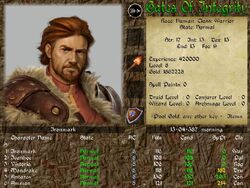Torment Kickstarter Update #21: Writer's Meet, 2D Backgrounds and Dialogue Design
Torment Kickstarter Update #21: Writer's Meet, 2D Backgrounds and Dialogue Design
Game News - posted by Infinitron on Tue 23 July 2013, 22:06:03
Tags: Adam Heine; Colin McComb; inXile Entertainment; Thomas Beekers; Torment: Tides of NumeneraIt's been almost two months since the last Torment: Tides of Numenera Kickstarter update, and so it's no surprise that today's update is massive indeed. The update consists of three main parts. In the first part, Colin McComb describes his experiences at Torment's epic first writer's meet. In the second part, environmental artist Gavin Glenn-McDowell talks about some of inXile's achievements in creating prerendered 2D backgrounds. In the third part, Adam Heine provides some new details on the game's dialogue system. The entire update is very interesting and absolutely worth reading, but it's the third part which is most relevant to the Codex's interests. Here's an excerpt:
Adam also reveals that dialogue options will not be tagged, such that you won't know you're using Active skills or Lore skills until you select a relevant option. The intention is to prevent such dialogue options from being too obvious. That and the die rolls might turn out to be controversial for the "anti-savescummers" among us, I suspect...
Conversations in Tides of Numenera will be a lot like what you remember from Planescape: Torment. The NPC will tell you something (maybe a lot of something—we're thinking up to 300 characters per NPC node), and you'll have a list of responses to choose from. Some of those responses might include actions to perform, skills to use, or telling the truth vs. lying.
What options you have available, and what the NPC says in response, can depend on many different things: what you've said or done in the past, how you've customized your character, who you choose to travel with, etc. (I recently wrote a post on basic reactive dialogue, if you're interested in how that works.)
And there are some design aspects unique to Tides of Numenera. There are the Tides, of course, which are shaped by your choices, and which affect what certain NPCs say and do. These work very similarly to how alignment worked in PST, but they're more complex. We're working through what those complexities mean now, and how they’ll impact dialogue design, exploration, and combat.
Using skills will be different, too (side note: I say "will," but we're still in pre-production, so any of this can change). Say there's a difficult task you want to attempt—lying to a prison guard or deciphering the text on an ancient puzzle box. Typically, in D&D-style RPGs for example, if you don't have the associated skill, your chances of success are very low, or you might not be able to attempt the task at all. In Numenera, all such tasks are treated the same, and anyone can try them. Training in a related skill or skills will lower the difficulty of the task, but even if you're untrained, you can still apply Effort.
Effort is a concept from the Numenera tabletop game. Essentially you spend points out of the appropriate stat pool (Might, Speed, or Intellect) to lower the difficulty of a task. The idea is, even if you've never been trained in lock picking, a very smart or dexterous character can, with some Effort, increase their chances of cracking a lock.
Your stat pools are renewable with rest. And of course, all of this is balanced. If you're trying to crack a combination lock created by a culture that died out millions of years ago, which requires a combination of smells rather than integers, well...you'd have to have a high-level character specialized in the task, who spent all the Intellect they had on Effort, just to make the task possible. That character would still have to roll ridiculously well.
Effort provides more options to customize your character and tackle obstacles. If there's a task you want to attempt—even if it's something normally contrary to your character build—you still have a chance of succeeding if you can use enough Effort. On the other hand, someone who has trained or specialized in that sort of task will have a greater chance of success, and will maintain that edge in similar tasks throughout the game.
I hinted at die rolls above, which brings me to something else I want to share with you. Active skills—that is, skills you choose to use and have the option to apply Effort to—will be done with die rolls. In dialogue, these skills will usually be things like Persuasion, Deception, and Intimidation, although other skills might find uses in dialogue as well. In some cases, if you fail a task, Effort can also be spent to gain a second chance.
But we have a whole category of Lore skills that represent your knowledge. These skills will enable certain response options in dialogue, giving you choices that a player without the skill wouldn't have. When this happens, there won't be a die roll, because the skill is being used without requiring effort on your part. The unlocked response options are just there.
Adam also reveals that dialogue options will not be tagged, such that you won't know you're using Active skills or Lore skills until you select a relevant option. The intention is to prevent such dialogue options from being too obvious. That and the die rolls might turn out to be controversial for the "anti-savescummers" among us, I suspect...













